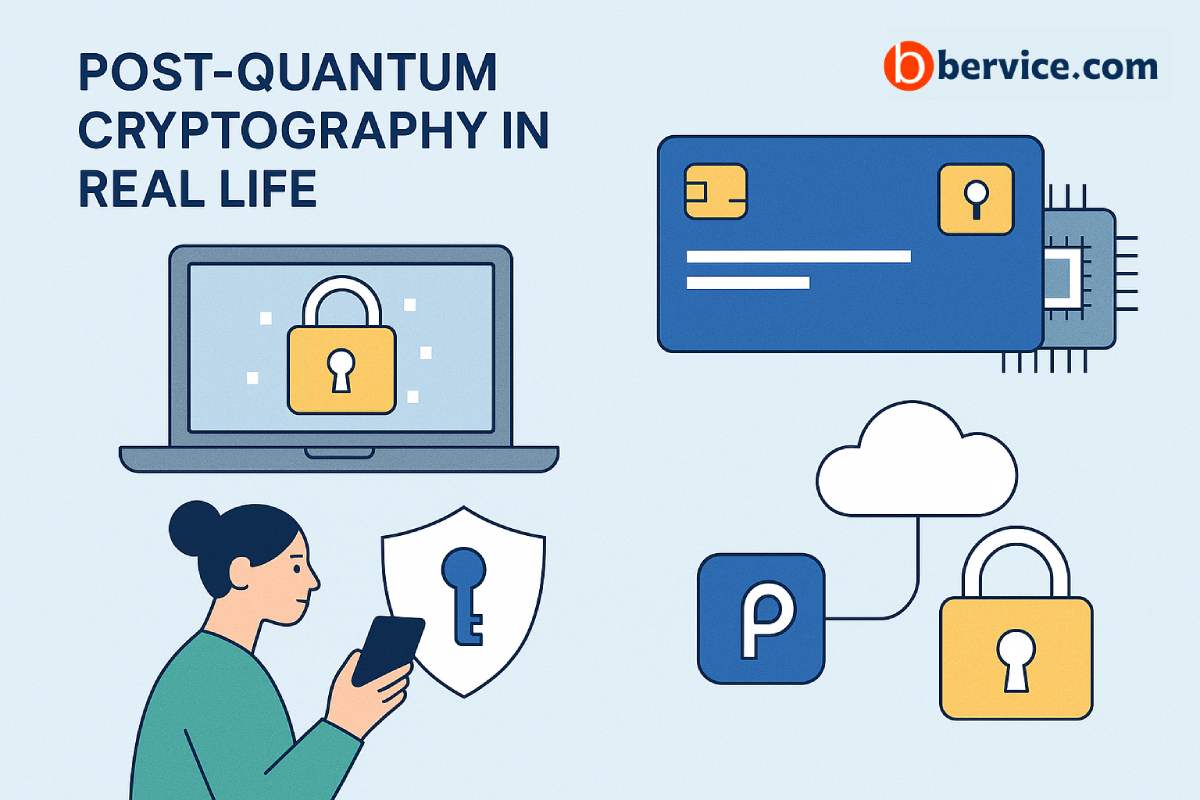Introduction: The Quantum Threat to Today’s Security
Quantum computing promises breakthroughs in fields like medicine, materials science, and AI — but it also threatens to break much of the cryptography that secures our digital world today. Algorithms such as RSA and ECC, which underpin banking, cloud storage, and even blockchain networks, could become obsolete once quantum computers reach sufficient scale.
Post-Quantum Cryptography (PQC) emerges as the answer to this looming threat. PQC algorithms are designed to withstand attacks from both classical and quantum computers, ensuring long-term security for sensitive data.
Bervice, a next-generation decentralized security platform, integrates PQC into its core architecture — not as a theoretical experiment, but as a real-world solution for password management, file storage, and digital identity protection.
Understanding Post-Quantum Cryptography in Simple Terms
Traditional cryptography relies on problems like factoring large numbers or solving discrete logarithms — tasks that are difficult for classical computers but trivial for sufficiently powerful quantum machines using Shor’s Algorithm.
PQC replaces these vulnerable schemes with quantum-resistant algorithms such as:
- Lattice-based cryptography (e.g., Kyber, Dilithium): Built on mathematical lattices, extremely hard to break even with quantum power.
- Hash-based signatures: Rely on hash functions that remain secure post-quantum.
- Code-based cryptography: Use error-correcting codes for encryption and digital signatures.
Bervice specifically uses Kyber768, a NIST-approved post-quantum key-encapsulation mechanism, combined with modern encryption like AES-GCM and Argon2 for password security.
How Bervice Applies PQC in Real-World Scenarios
1. Secure Password Vaults
Bervice encrypts every password and secret locally using quantum-resistant keys before syncing to decentralized storage. Even if an attacker obtains the encrypted data, decrypting it without the PQC keys would be computationally infeasible — today or in a post-quantum era.
2. Decentralized File Storage with IPFS
Files stored on IPFS through Bervice are encrypted end-to-end with PQC keys. Unlike centralized services, there’s no single point of failure, and the quantum-safe encryption ensures future-proof confidentiality.
3. Zero-Trust Architecture for Web3 Identities
Bervice combines Post-Quantum Cryptography with decentralized identity (DID) frameworks. This enables secure authentication and access control for blockchain-based applications where private keys must remain uncompromised, even decades into the future.
4. Hybrid Classical + Quantum-Safe Security
To maintain compatibility, Bervice employs hybrid cryptographic schemes — using both classical and PQC algorithms together during the transition phase. This ensures security against today’s threats while preparing for tomorrow’s quantum risks.
Why This Matters for Businesses and Users
- Future-Proof Security: No need to migrate or re-encrypt data when quantum computers arrive.
- Regulatory Compliance: Governments and enterprises are already drafting quantum-readiness roadmaps (e.g., NIST PQC standards).
- Trust in Web3: PQC ensures crypto wallets, smart contracts, and decentralized storage remain secure in a post-quantum world.
- User Privacy: Individuals regain control over their digital identities without relying on vulnerable legacy systems.
Looking Ahead: Bervice and the Quantum-Safe Internet
The transition to a post-quantum Internet won’t happen overnight, but platforms like Bervice demonstrate how to make this shift practical today. By merging decentralized storage, advanced cryptography, and user-centric design, Bervice isn’t just anticipating the quantum future — it’s building for it.
As quantum computing advances, one thing becomes clear: security must evolve ahead of the threat. With Bervice, Post-Quantum Cryptography moves from research papers to real-world protection — giving users peace of mind in a rapidly changing digital landscape.
Connect with us : https://linktr.ee/bervice
